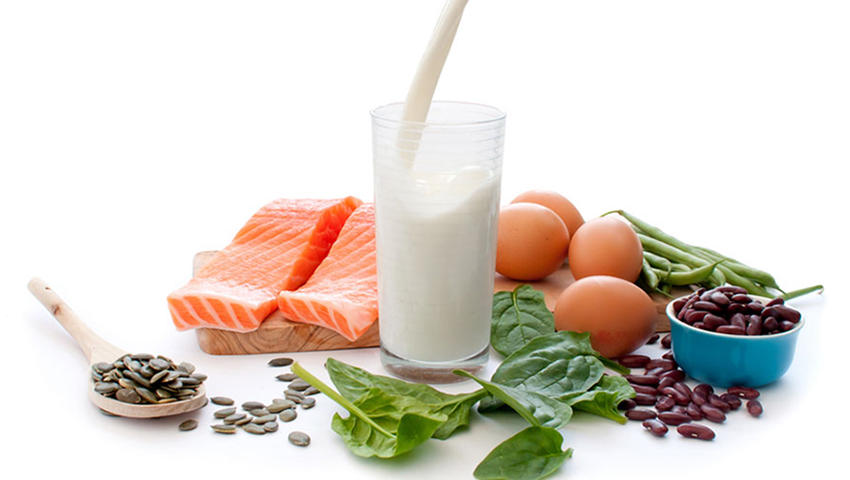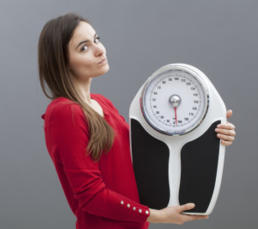Protein is an incredibly important nutrient in the body - if we do not get enough of it, we suffer.
When it comes to how much is actually enough, there are many different theories in that regard.
For most health authorities, a more moderate intake of around 0.8g protein for every kg of weight. Basically, that means taking your current weight and multiplying it by 0.8g.
Like most recommended daily allowances, however, this is merely enough to prevent symptoms of deficiency, not for optimal health.
It is a much more individual topic - how active you are, what percentage of muscle mass you have, how healthy you are, etc.
What Is Protein And Does It Matter?
Proteins make up the basis of many of the body's tissues. They are found in skin, muscles, tendons and major organs are all made from protein.
In addition, hormones, enzymes, neurotransmitters, etc. are all made from protein.
So, does protein matter? Only if you want to live.
Strings of amino acids make up proteins in a usable format. These linked chains can be very long and can be shaped in a very complex manner.
We can produce some amino acids ourselves but there are those that we must source externally. Those that we are unable to make are known as essential amino acids.
It is also about more than just the amount of protein but also the quality of that protein.
Usually speaking, all the amino acids we need in the correct ratios are present in protein derived from animals.
For people who eat meat, and consume it regularly, you are probably doing okay.
For those who stick to a vegetarian diet, getting enough protein is possible but it does take more thought and creativity.
For the most part, your average person does not need protein supplement powders. However do speak with you healthcare professional if you are feeling dizzy or weak. There are many nutritional supplements which offer nutrition and digestive aid to fill in the gaps in your diet.
Protein and Weight Loss
If you need to lose weight, protein has a key role to play.
In order to drop a few kilos, you need to consume fewer calories that what you use.
Protein is helpful in curbing your appetite and by revving up your metabolism - facts proved by science.
In fact, if you make sure to get about 30% of your daily caloric intake from protein, you may be able to rev up your metabolism by as much as 100 calories per day.
One study showed that obese men, by having a quarter of their calorie intake come from protein were able to halve the number of midnight snacks and also found that obsessing over food became 60% less likely.
Protein isn't only going to help you drop the weight, it could also play a role in you gaining more.
One study looked at post-menopausal women who were overweight. It found that increasing their protein intake by 3% was actually halved the amount of weight that they regained once the diet was finished.
If you do not get enough protein and are dieting, your muscle mass is at risk and this is a pretty dangerous thing. The higher the muscle mass, the more calories you burn at all times.
Another plus when it comes to protein is that it is a lot easier to stick to your diet because you are not so hungry all the time.
Improve The Strength Of Your Muscles
Muscles are pretty much protein and they are always changing. They also need to be challenged in order for them to be maintained.
Basically, the body needs to be making more of the muscle protein needed for building muscle than it is breaking down.
People who do weight lifting will understand this - lifting heavy things causes your muscles to break down and that is why it is imperative to increase your protein intake.
Studies have shown that the higher the protein levels taken in, the stronger and more muscular the person.
The problem with dieting is that, should you not eat enough protein, the body may cannibalize your muscles in place of using fat stores.
The current recommendations when it comes to building muscle are to ingest 2.2g of protein for every kilo of weight.
This is, of course, just a guideline and you will be the only one who can really decide what is enough for you. You have to take into account your lifestyle, activity levels, etc.
Dietary Protein Is Important
Eggs, meat, fish and dairy are the best dietary sources of protein and contain all the amino acids that you need.
Fish, in particular, provides high amounts of omega-3 fatty acids which are essential for heart and brain health. If you do not eat enough fish, you can take an omega-3 supplement.
In addition, there are plant products that are sources of protein. Examples are quinoa, legumes and nuts.
For most people who eat a balanced diet, tracking how much protein they consume is unnecessary.
All you really need to do is to eat a serving of good protein at every meal and you should be doing fine.
You May Need More If:
Putting muscle mass aside for a minute, those who are more active do need to get more protein than those who are not. If you are doing intense physical exercise, make sure to eat more protein.
Additionally, you'll need to eat more protein as you age - about 50% more. This is in order to stave off sarcopenia and osteoporosis.
If you are in recovery after an accident, you should look at increasing protein intake.
Is Protein Bad For Me?
Protein has come under fire for a number of different reasons - those who are opposed to it believe that excessive amounts can lead to renal failure, osteoporosis and a number of other problems.
Science has now put this theory to bed. In healthy people with renal problems, it is not necessary to reduce protein intake.
It has, however, been proven useful in the treatment of high blood pressure and in the fight against diabetes.
The attempt to blame protein for the development of osteoporosis was short-cited. It may initially cause some calcium to leak from the bones but this is a very short-term effect. In the long term, protein has been shown to increase calcium uptake and thus stop osteoporosis from developing.
There is no evidence that those people who are healthy have any negative effects, even with a high protein intake.
What Does "Gram of Protein" Mean?
This is where it gets confusing - the gram of protein refers to the actual nutrient, not the food it comes in. An egg, for example, is around 46g but only 6g of that will be protein.
And Joe Blogs?
If you do not need to lose weight, are pretty sedentary and don't go to the gym - like most of us - about 0.36g to 0.6g for each pound of weight is a good starting off point.
Basically about:
- 56g-91g daily for Joe Blogs
- 46g-75g daily for Mrs. Joe Blogs
Start off with these totals and add if you feel you need to - rather get too much than too little.












